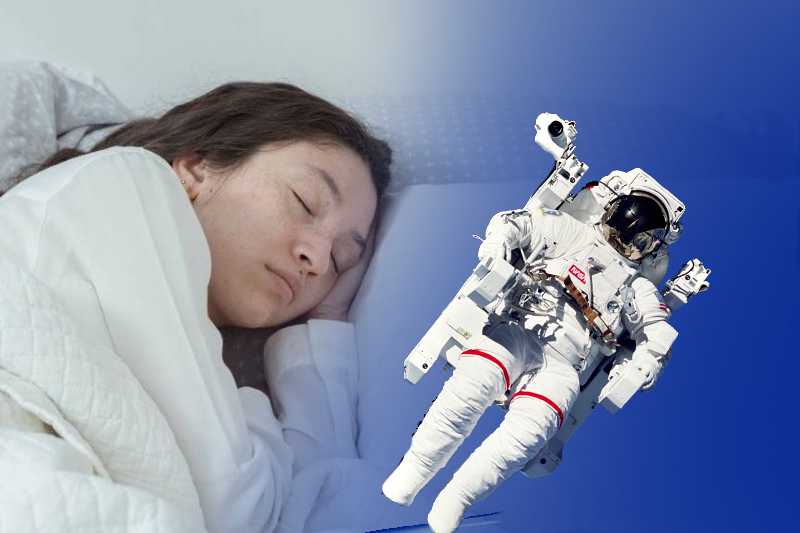
experts say sleep like an astronaut—here’s why
Getting enough sleep is often stressed. How do astronauts sleep? Sleep experts noticed their unusual sleep habits. This blog will explain why experts think we should sleep like astronauts and how their habits can improve our health.
Sleeping in space is different. Astronauts don’t have gravity or a comfortable bed. They also experience noise, changing light, and no day-night cycle. These factors can disrupt sleep and affect performance and health.
Like astronauts, we need quality sleep to function well. Sleep is essential to our health. It improves memory, cognition, immune system regulation, and body restoration. Poor sleep can cause mood swings, decreased productivity, poor concentration, and illness.
Can you sleep better in zero gravity?
We all know the value of sleep. Feeling rested reduces the risk of serious health issues and helps maintain a healthy weight. Mentally, it reduces stress, helps you focus, and gives you energy. It’s frustrating to have trouble sleeping. To see if the zero gravity sleep position could help those who need it, we asked sleep experts.
What’s zero gravity?
What is the zero-g sleep position and how does it work? Lauri Leadley, CCSH, RPSGT, Valley Sleep Center’s founder and president, said, “It’s a sleeping position that elevates the head and feet slightly above the heart level, creating a slight slope for the body.” “The angle between the upper body and the thighs is about 120-130 degrees, and the knees are bent slightly in the zero gravity sleep position.” This means your hip angle puts your body in the “zero stress zone,” freeing airways, reducing heart stress, and decompressing your spine.
Keep Reading
Kevin Lees, Director of Chiropractic Operations at The Joint Corp., said, “Zero gravity sleeping position is typically done with an adjustable bed, raising the head and knees so they are similar height.” “This position is very similar to a foetal position, only while laying on the back.” Because it allows long-term sleeping in this position, some call an adjustable bed a zero-gravity bed.
What are the advantages of zero-gravity sleeping?
Leadley said sleeping in zero-g, inspired by an astronaut’s position during lift-off, may reduce neck and body pressure and “alleviate back pain, reduce snoring, and improve circulation.” She added that “changing one’s sleep position alone does not guarantee a good night’s sleep.”
Lees added that sleeping in a zero gravity position relaxes the body and supports the mattress in all areas. “It improves breathing for some,” he said. “Raising the head improves certain breathing conditions.” Knees bent can relieve lower back pressure and improve circulation.” He added that this position can “eliminate the need for many pillows, which tend to move around during the night and lose their position” for pillow users.
According to Sleepopolis Certified Sleep Science Coach and Sleep Health Content Specialist Carlie Gasia, the zero gravity sleep position can “help to alleviate back pain and reduce pressure on the spine.” Because the angle of elevation reduces gravity on the spine, it can relieve muscle tension and reduce compression on the vertebral discs. This position can help the nearly 65 million Americans who had back pain recently and the 8% of adults who have chronic back pain.
Visiting a sleep doctor
Before making a big purchase or changing your sleep habits, talk to your doctor about poor sleep, which can lead to serious health issues. Leadley advised seeing a sleep doctor if you’re changing your sleep position to zero gravity to relieve the symptoms and disruptions above. “Ask for a sleep study – and find out why you have trouble sleeping so you can enjoy different sleep positions throughout the night.”
Gasia added, “But if you have certain medical conditions like acid reflux or heart problems, may not benefit from this position.” The zero gravity sleep position reduces snoring and sleep apnea. Before trying it, consult a doctor. Lees also advised against trying this position if you’re a side or stomach sleeper.
Zero gravity sleepers may claim the benefits above, but if you wake up tired or think you may have sleep apnea or another serious sleep condition, see a doctor. Adjustable beds and zero gravity loungers cost thousands, so buying one only to find out it wasn’t necessary is a waste of time and money.
However, adjustable beds offer other benefits. It’s great for reading or watching TV in bed, and it’s great for finishing up work on your laptop before bed. Buying a Sleep Number bed that lets your partner adjust their side can improve your night’s sleep.
Lessons from Astronauts’ Sleep:
1. Keep a Regular Sleep Schedule:
Even in space, astronauts have a sleep schedule. To establish a routine, they sleep 8 hours per night. Consistent sleep schedules on Earth help regulate our internal body clock and improve sleep quality.
2. Sleep-Friendly Environment:
Astronauts prioritize sleep despite limited space and resources. Eye masks, earplugs, and sleeping bags simulate a comfortable sleeping environment. This can teach us to make our bedrooms cool, quiet, dark, and use sleep aids if needed.
3. Deep breathing and visualization help astronauts relax before bed.
These methods reduce stress and relax. Meditation, gentle stretching, and reading can help us relax before bed.
4. Sleep hygiene is important to astronauts.
To improve sleep, they avoid caffeine and stimulants before bed, limit blue-light exposure, and exercise regularly. These habits can help us sleep better.
5. Accept Napping:
To avoid fatigue, astronauts take short power naps. Short naps improve alertness, memory, and productivity, according to research. When we’re tired or need a mental boost, short daytime naps can help.
Conclusion:
Astronauts teach us how to optimise sleep. Following their example, we can create healthy sleep routines, a sleep-friendly environment, and prioritise relaxation and sleep hygiene. Like astronauts, we can benefit from better sleep quality. Thus, let’s rest like astronauts. Sleep tight!









